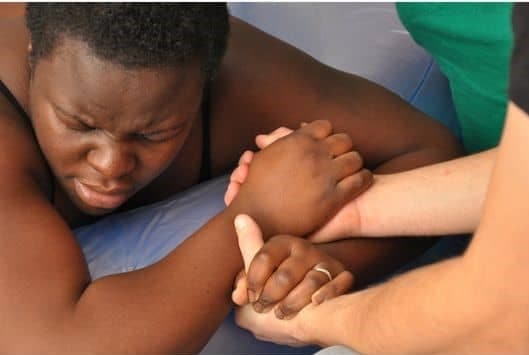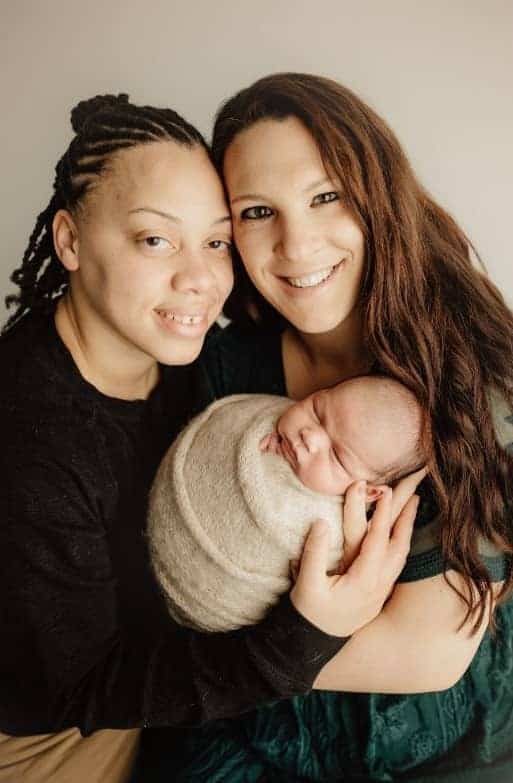Who delivers your baby matters a lot to some pregnant and laboring people. And not just in terms of feeling confidence and trust in your birth provider. Research is just beginning to show that there may be health benefits for moms and babies the more similar they are to their birth provider. The reality is that in most parts of the world, birthing people can’t choose the person who delivers their baby. Suppose you do belong to an under-represented part of the birthing community or care about who will be by your side through labor and delivery. In that case, you may want to be a bit more selective in choosing the right provider for you.
Provider-Patient Concordance and Birth Outcomes: What Do We Know?
It is not news that many of us who identify as female prefer to have another woman getting up close and personal with our lady parts. But what about if you come from a racial or ethnic minority? Or identify as a member of the LGBTQ community? Are plus-sized and have a fat-phobic provider? Is your birth actually safer for you and your baby if your provider is as similar to you as possible?
It may be. When providers and patients share the same perceived race, it is called race concordance. Most current research examines how racial concordance impacts birth outcomes. Some of the birth outcomes researchers and doctors study are preterm birth, low birth rates, the number of infants dying in childbirth (infant mortality), and the number of mothers dying in childbirth (maternal mortality).
In the US, black newborns die at three times the rate that white newborns do. Unfortunately, researchers studying whether having a birth provider of the same perceived race might help save newborn lives do not have a clear answer for us. Some studies show fewer deaths among black newborns when the birth providers were also black, but other studies show no effect.
According to the World Journal of Gynecology and Women’s Health, black maternal mortality is the elephant in the room – a painfully obvious public health crisis that people choose to ignore or not discuss because nobody likes to talk about racism. In the US, black women die in pregnancy, childbirth, or within six weeks after delivery, at three times the rate of non-Hispanic white women.

Doctors, public health researchers, and social justice advocates identify three causes of this devastatingly high rate of unnecessary death of black mothers in the US. First, black women may be more likely to have health risk factors (heart or cardiovascular) before becoming pregnant. Second, black women may have complications during pregnancy (like problems with gestational diabetes or high blood pressure) that makes birth more dangerous for them. The third reason is the one nobody wants to talk about – providers’ racial bias and patients’ perceived racial discrimination that corrodes black women’s trust in their providers and the medical system at large.
Patient-Provider Mismatch is a Risk for LGBTQ Birthing People Too
Despite greater acceptance of same-sex marriages and parenting and research showing the positive benefits of LGBTQ parenting, lesbian, gay, bisexual, transgender, and queer individuals face challenges in accessing reproductive health services. As a result, they also can experience worse birth outcomes.
Challenges include stigma, discrimination, fear, inequity in health care insurance and reproductive healthcare coverage, and provision of “substandard care,” according to the Kaiser Family Foundation’s 2015 Issue Brief. Even well-meaning professionals who lack an understanding of how to provide compassionate, respectful, and culturally appropriate LGBTQ-inclusive care can cause harm.

Research suggests that some subgroups of the LGBT community have more chronic conditions and a higher prevalence and earlier onset of disabilities than heterosexuals. LGBTQ people are less likely to access preventative reproductive health care such as routine sexually-transmitted infection screenings, pap smears, or mammograms.
One study of almost 20,000 US pregnancies from 2006 to 2015 found that, compared to heterosexual women having sex with men only, bisexual and lesbian women were more likely to report miscarriage, a pregnancy ending in stillbirth, or very preterm births. Lesbians were more likely to report low birth weight infants than heterosexual women.
A Biological Explanation For How Provider Discordance Could Affect Birth Outcomes
Unhealthy amounts of mental distress during pregnancy and childbirth may burden survivors of racialized, gender-, sexuality-based, or body-size-based trauma. While not yet proven, researchers hypothesize that chronic stress and anxiety in marginalized or under-represented pregnant people put mothers and babies at risk.
Human and animal studies show that activation of the human stress response (also known as the fight-or-flight response) can cause changes in brain chemistry and hormonal communications in pregnant people and their fetuses. These changes in brain chemistry and hormones can pass down to later generations. The intergenerational effect of trauma, racism, and gender-based discrimination is only just beginning to be understood.
The known effects of chronic anxiety during pregnancy include a higher risk of preterm birth, attending fewer prenatal care appointments, and a greater chance of delivering a low birth weight baby. In addition, people with prenatal or chronic anxiety, depression, or post-traumatic stress disorder (PTSD) are also at higher risk for postpartum depression.
We also know that fear, stress, and anxiety during childbirth can increase cesarean section rates. Black women in the United States are more likely to deliver by cesarean section than white women. People are three times more likely to die in childbirth via cesarean than vaginal delivery. Hormones released by the fight-or-flight response can slow labor progress. Being anxious or afraid can make labor longer and more dangerous for birthing people and their babies.

Having a provider of a different race, culture, or sexual orientation can retraumatize survivors. Even the perception that a provider is biased or racist can cause fear, anxiety, and distress. Trauma survivors may be less likely to attend prenatal care visits if they distrust the medical system or providers. This is how having a provider you trust can help you to have a healthy pregnancy and safe birth.
How to Choose the Right Provider for You
Unfortunately, for many birthing people, health insurance status, geography, or the health care system itself chooses their provider for them. It can pay to do your research, however, and find out just what your options might be.
- Talk with your health insurance provider to determine which doctors or midwives your health insurance plan covers.
- Talk with family, friends, and coworkers you consider allies about their childbirth experiences. Ask them about all of the practice’s providers. Was their hospital or birth setting (and other staff) inclusive?
- Interview several different providers at several practices. Before your interview, list 5-6 of your biggest fears about pregnancy and childbirth. Then, talk through the questions with each candidate. This can help you figure out if you share the same birthing philosophy.
- Consider all of the birthing options – Midwife or doctor? Hospital, birth center, or home birth?
And remember, you can change providers mid-pregnancy. It might be a bit of a paperwork hassle, but your mental and physical health are worth it. Childbirth providers are professionals, so you do not need to worry about hurting their feelings. You deserve to be cared for by someone you trust, who makes you feel supported and understood.
How To Have A Good Birth Even Without Your Chosen Provider
Finding a provider who you trust and who you feel confident will keep you and your baby safe can ease childbirth anxiety. Unfortunately, there is no guarantee that you will have your chosen provider for your labor and birth. However, you and your partner can prepare for that possibility by taking the following steps:
- Hire a doula who matches your inclusivity needs and who can commit to attending your birth, no matter what.
- Find inclusive childbirth classes. Look for customized classes for LGBT families, black birthing people, or plus-sized pregnancies, for example.
- Surround yourself with a rock-star pregnancy, labor, and postpartum support team of only your chosen friends, family members, or allies. Don’t invite people who stress you out or who won’t support you.
- Create and discuss your need-specific birth plan with your birth support people, your doula, and your provider. Consider choosing an inclusive birth plan like these Anti-Racist Prenatal Care Preferences, developed by Erica Chidi Cohen, doula, and founder of LOOM.
- If you have a history of trauma, anxiety, depression, or other mental health vulnerabilities, consider seeing a therapist or counselor in pregnancy. Look for professionals trained in Cognitive Behavioral Therapy (CBT), mindfulness, conscious conception, pregnancy, and birth.
- Consider taking classes during pregnancy to learn anxiety-busting techniques such as relaxed breathing, progressive muscle relaxation, meditation, hypnobirthing, or yoga.
Even the calmest mother-to-be with a concordant provider will have pre-childbirth anxiety. Regardless of your race, culture, body size, or sexual orientation, childbirth is a foreign land. A hospital or a birth center is strange and unfamiliar territory for most people. Finding a familiar provider for you could help you have a safer and healthier birth.
Leave a Reply